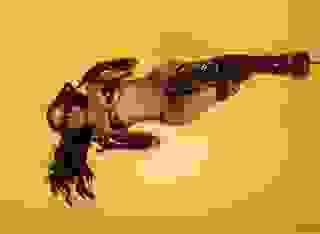- Gay Male
- Journey of Rick Heiden Ch. 02
Note: You can change font size, font face, and turn on dark mode by clicking the "A" icon tab in the Story Info Box.
You can temporarily switch back to a Classic Literotica® experience during our ongoing public Beta testing. Please consider leaving feedback on issues you experience or suggest improvements.
Click hereAll Rights Reserved © 2018, Rick Haydn Horst
This is a work of fiction. Names, characters, businesses, places, events, locales, and incidents are either the products of the author's imagination or used in a fictitious manner. Any resemblance to actual persons, living or dead, or actual events is purely coincidental.
Synopsis: [This is the journey of Rick Heiden, who steps beyond his comfort zone, and his life is never the same. He travels to another world and learns that more to him exists than the introvert who revels in the quiet calmness of his apartment to read the latest novel by the fireplace.]
This novel contains 50 chapters.
CHAPTER TWO
The actual signing was as anticlimactic as one might expect--I signed a mere piece of paper. However, it granted me access to the answers I wanted. They had put me through too much to give up.
Mr. Haywood slid another file to Ms. Newton. "We are holding a person of interest. Evidence suggests he speaks Japanese. Certain incidences, beyond your purview, indicate that he has knowledge of national importance. However, he refuses to speak with us, so we have a problem. Agent Levitt--whose assessment I accept--believes you can solve it. Will you enlighten the others as to why you think this, Agent Levitt?"
Mr. Levitt expected this; he sounded as if he had rehearsed his reply. "If we needed nothing more than an interpreter, ours should have proved more than adequate, but we tried that."
"He failed," said Mr. Haywood.
"Correct," Mr. Levitt said, "the man wasn't willing to talk, and I suspect we carry the fault for that. Our guest has only spoken one Japanese word, Dashite, which in English means let me out, and nothing else. So, baring the American route of torturing him till he tells us what we want to know, which I believe we all view as repulsive and criminal, we need something more. In comes Mr. Heiden, with talents beyond that of an interpreter, from what I've witnessed, he is a strong intuitive empath."
I just looked at him, not sure where he was taking it, and it seemed strange for someone to talk about me while in the room, but he had said to follow his lead.
He continued. "An intuitive empath uses their native intuition to understand what someone says. They feel what others feel and draw others to them." He addressed me, "Mr. Heiden, have you ever just met someone, and they start telling you about their troubles after only a few minutes?"
I had to think about it. "Often, but doesn't that happen to everyone?" I asked, looking for confirmation from the others.
"No, Mr. Heiden, it doesn't," he said. "Also, I've watched you when you interpret. You latch onto what someone means even when they speak in vague terms. I've even watched you know what people feel, and sometimes think, just by looking at them."
I almost burst out laughing. "Please, don't hype me as a mind reader!" I said, not wanting the others to think he meant anything of the sort.
"Oh, I wouldn't accuse him of mind reading," he told the others. "The impressions people give him he intuits into thoughts." He bent down to look into my eyes. "You amaze me."
Levitt had beautiful amber eyes. His closeness caused my breathing to become a little erratic, and I could feel my heart beating, but then I glanced at the faces of the others at the table. "You better stop. You're making them wonder if they've made a mistake." At that, I noticed several raised eyebrows.
Levitt stood erect once again. "If you want something more concrete," Levitt said to them, "Mr. Heiden works as a professional interpreter, he has fluency in the Japanese language and has studied the intricacies of Japanese customs. However, his skill as an intuitive empath will make a difference."
Mr. Haywood sat unconvinced with a contemptuous gaze. "Complete nonsense."
"That will do, Mr. Haywood," said Ms. Newton.
"What will this entail?" asked Mr. Park from the Government Office for Science.
"We let him see what we found on the man," said Levitt, "we introduce him to him, and let him take over from there. I think before long our guest will lower his guard enough to talk to us."
After some deliberation, they decided it couldn't hurt to try. I found it hard to feel gratified with such a dismal level of confidence.
Levitt and I took the lift to what I mistook as the basement. Beneath the building, an excessive amount of LED lighting illuminated a veritable labyrinth of spacious, clean, groin-vaulted rooms connecting long and identical, barrel-vaulted corridors. If I hadn't seen the console tables on every wall with the potted plants, I would have expected someone to sacrifice me to the Minotaur. Carpet and tiny white acoustic tiles covered every surface. The air felt dry with an odor typical of hyper-purification; it smelled of activated carbon and paper with a bit of ozone.
As I followed Levitt, I mused over the words the man spoke, "Let me out. You wouldn't have him manacled to a wall in some old dungeon down here, would you?"
Levitt and I stopped at one of the doors that looked as though he had chosen one at random; they all looked the same. "He intimidated them," he said, "and they felt threatened, so they locked him into an observation room. We have his things in here."
Two people worked in the room, lined with large pieces of scientific equipment, various devices of sophisticated appearance, and several laptops scattered on tables. Levitt asked them to leave us. They nodded and told us Katheryn Elliot had informed them that we were coming. Levitt gestured to a table with a variety of objects upon it. It held a small stack of clothing, a pair of boots, a three-foot-long, double-edged sword with its scabbard, and a harness. After the two left and closed the door, he told me as much as he could.
"They don't monitor this room, so we can talk here. I don't know how much time we have, and I need you to listen. Okay?"
I nodded.
"I am sorry," he said, "I had nowhere else to turn. I need your help. A man named Cadmar, like Amaré--that's the name of the man in the observation room--came to London to take me home. He died, and the government has him in a facility somewhere. If I know the government, they will dissect Cadmar's body. I must find him so that Amaré and I can take him home. His body cannot remain here. I need to retrieve him, but I can't do that without you."
I realized he was putting me on the spot, and no one likes that, but he looked so adorable. I could feel his desperation. "What did you need me to do?"
"Amaré knows who I am, but he only speaks Japanese, and I don't. I need you to get him to talk to the people here. It doesn't matter the topic so long as he keeps them busy. Tell him that I'll help him when I can."
"Okay," I said, "but what's with all the intuitive empath stuff upstairs?"
"Well, you are, but I had to use some reason to get you into the facility. As I said, I don't speak Japanese."
"I get that, but why did you pick me?" I asked. "If you want my help, I need to know."
"I wanted to become part of the Sharing," he said. "So, I became a student of the Trust, volunteering to come here to find people who would do well with us. I have an acquaintance in immigration who brought several asylees to my attention when each of you requested a work visa. Everyone knows that the Americans put you all into a ridiculous situation, so I made sure someone nudged you in the right direction so you would be okay. Not every asylee took the help I gave them, but I recognized you at the party at Kensington Palace that night. I marveled at seeing how well you'd done. Since then, I had the thought that I would invite you to come with me when I leave."
I hadn't understood some of that. "I appreciate the help you gave me, but you side-stepped my question. Why me? I need to hear you say it."
"When I met you at the party...I liked you in an instant, and I thought we might do well together."
I almost hugged him, but we hadn't the time, so I engaged my mind to the task at hand. "Okay, let's...let's set all of that aside for the moment. We'll discuss that later. How do you know that about Cadmar?"
He turned to the table behind us and removed a cloth that covered what lay upon it; it had a sword and a sizable gold ring with a one-carat diamond embedded into it. He raised the beautiful, weighty sword to examine it. It looked like Amaré's gold one with the round guard, grip, and pommel made of silvery metal. The front of the pommel on both swords had a kind of cup carved upon it. When Levitt flipped the sword over, I saw the name Cadmar embossed in high relief with the inscription: Scientia nos Defendit (Knowledge Defends Us)--a motto, I supposed. The back of Amaré's sword held no name, but it did have the same inscription. They had a modern appearance for such ancient weapons.
"He must have died," Levitt said, "otherwise, he would have his sword with him, and more telling, he would never consent to remove his ring." He held the ring before me. "Also, Amaré would come here for no other reason. I heard he can't stand to see this planet."
What a curious thing to say. No doubt many people couldn't stand to see the Earth, we find its destruction hard to watch. However, "be here for no other reason," gave it a strange meaning.
I glanced over Amaré's clothes. They consisted of a black shirt, a scarlet red, Asian-style jacket of soft, flexible fabric that appeared stiff. The shoulders and sleeves had an exquisite, metallic gold embroidery in an ivy motif. The designer had made his unusual pants of black, twill-like fabric and had installed a codpiece.
"Why does this have a codpiece?" I asked, trying not to laugh.
"Where I'm from, many things have managed to stay in vogue."
Then I noticed one thing and realized something that should have been obvious. "These clothes are enormous. What size boots- Wait, these are Amaré's clothes. What's he wearing now?"
"Nothing, I'm afraid. A bit of an altercation occurred when Amaré arrived. No matter how proficient the swordsmen, projectile weapons will always win. They shot him with a tranquilizing dart in Surrey, rendering him unconscious before they brought him here. They removed his clothing to examine them and disarmed him. I don't know why they haven't return them. They tried putting him in something else, but nothing else would fit."
"Wouldn't he find that humiliating?"
"Oh no," said Levitt, "nudity is nothing where we live. I saw him conscious later. He seemed upset, of course, but not about that."
"I've never heard of any place like that."
"It's beautiful and peaceful. I think you would like it."
"Where is it?" I asked.
"That requires more explanation than we have time for me to convey."
"I bet it would," I whispered to myself. It had all gotten a bit weird, but then I thought, "No one knew what the government knew, except the government." I intended to take everything at face value at that moment. I hadn't known what to make of Mr. Levitt. I heard his sincerity, so that encouraged me to believe him. I decided that so long as evidence never contradicted him, I would accept his claims on a tentative basis. Katheryn Elliot and Aiden Park, of the Government Office for Science, entered the room. "Hello again, Ms. Elliot and Mr. Park, what can you tell me about what you've learned so far."
"We've learned some things," she said, blinking and nodding her head. "So far, we know he does drink water, but he doesn't have to eat much or often. We have observed him for fourteen days, and while he has drunk little more than thirty-nine liters of water, he has eaten maybe once a week without any adverse effects." She looked at me for a split second as if waiting for the usual shocked reaction that accompanied such news.
I hadn't given it to her. At that point, I think my shock tolerance had reached a new high. "How is that possible?" I glanced at Levitt.
Mr. Park displayed a full-body digital x-ray on his tablet. Levitt and I exchanged looks. Unless they kept him sedated, I doubted they had time to x-ray Amaré. If Levitt's story held, they had someone else on whom they could perform many tests. The x-ray showed anomalous non-biological components throughout the body, and inside the skull.
I could tell, the scan excited Mr. Park. "He has various technological mechanisms throughout his body. We believe they recycle and allocate all the resources of his anatomy, helping to maintain homeostasis for extended periods with reduced nourishment. The only waste he seems to excrete is urine."
"What are the solid-looking objects inside the skull there?" I asked.
"We know he has synthetic eyes," said Mr. Park. "They look normal from a distance, but as you can see here, they're not biological. The eyes must enhance his vision in some way. The rest of this, we can only guess."
"This person looks too small to be the man in the observation room," Levitt said. "Who is this?"
"Well, no," said Ms. Elliot, "it's someone similar who died in an accident involving an automobile. When the first responders saw his eyes, they told the police on the scene, and eventually, he came to us."
It supported Levitt's story. I stepped up and made the next reasonable overture. "May I see the body?" After that, Levitt looked me in the eye, and from the look on his face, I believed I knew what he was thinking. I thought then that maybe Levitt had something to that intuitive empath stuff.
"I'm not sure," Ms. Elliot said. "It might prove difficult. I would have to ask permission to show it to you, but the others have already gone; it is Saturday. I'll ask, but you may not hear from me before Monday."
"They've already gone?" I asked. "What if the man talks?"
"We record everything in the observation room," said Mr. Park. "If the situation changes, we will inform the appropriate people."
"Have you finished with this man's clothing?" I asked, pointing at the table. "Because you should give them back. I understand why you felt the need to lock him up, at least in the beginning. You wanted the opportunity to study him like a lab rat, but if you want the cooperation of a Japanese man, don't keep him locked up and naked." I shook my head. I hadn't even met Amaré, but I knew they had treated him rudely, and it displeased me.
Ms. Elliot folded the clothes and handed them to me. She intended to leave the boots. I understood the need to keep his sword, but I insisted the rest come with me. At that point, Levitt and I left to speak to Amaré. The monitoring inside the room would limit the conversation; some things needed open discussion, and I had many questions, but they would have to wait.
Levitt led me to the room, and I asked him to remain outside with the two guards. He watched through the door's window.
I entered the room, clothes in hand. I stood in a chamber twelve feet high, twenty feet wide, and twenty feet deep, but they had divided the room's depth in half with a floor-to-ceiling, reinforced glass wall, through which they had drilled a dozen holes the size of a two-pound coin.
The man behind the barrier appeared to sleep and hadn't awakened. He laid nude on his back upon the bed that unfolded from the wall. Because the bunk they provided was a standard twin-sized, it forced him to bend his knees to fit, and its width couldn't hold his body with any comfort. The man had a considerable amount of muscle but not too excessive. To hazard a guess, he appeared in his mid-twenties with beautiful, lustrous skin like fine silk the color of cinnamon. And from the angle, he had a handsome profile.
"Please, accept my apologies for disturbing you," I whispered in Japanese. I loathed disturbing someone in repose. He opened his eyes but hadn't moved. In such a simple motion, his calm and relaxed body language told me his circumstance hadn't fazed him. He had slow and even-paced breathing, with a face that held no readable expression. "Honorable Sir, I have insisted they return your clothing."
In one fluid motion, he rose to his feet with the grace unthinkable of a man his size, standing to his full height. At eight feet tall and commanding in stature, this man was immense. His predominant appearance had Japanese ancestry, but he also looked African. I knew that would make him Hafu in Japan and rejected as Japanese. From that new angle, I thought he looked handsome with his short, well-kept, jet-black hair, but with no facial hair or other body hair. Someone less confident might show more modesty, but this man stood tall like an emperor surveying his domain, holding a posture of distinction. He stood staring.
In the tradition, I made a low bow of acceptable duration. I placed Amaré's clothes, boots, and the sword's harness into the secure pass through near the sidewall used to supply food and water. When I returned to where I stood, he spoke, "Arigato gozaimasu," thanking me, and made a small bow of acknowledgment.
I spoke in Japanese. "It was nothing," I said. "I am Rick Heiden, here at the special request of Mr. Levitt. My apologies for the less-than-ideal circumstance of our first meeting." I bowed again in apology. "Will you honor me with your name?"
I knew his name, but the officials there kept referring to him as "the man," or giving him other euphemisms, which had grown tedious. If the British government knew his name, Levitt and I could stop feigning ignorance over it.
"Watashi no namae wa Amaré desu," he replied.
As I thought, my reference to Mr. Levitt made a difference. As Japanese tradition dictates, we made small talk for about ten minutes during which we had several silences. He motioned for me to come closer, so I moved to the glass. At the risk of rudeness, I looked up into his face and found myself unable to look away. Their beauty fascinated me. I saw Amaré's eyes, those marvelous mechanical eyes. The shadowy reflection of the room shone in the artificial cornea, and the glide of the focusing mechanism spiraled as he brought his face level with mine.
He whispered, "Watashi o hanashite kudasai (Please, let me go.)"
"I wish I could. The people here are ignorant. Mr. Levitt says if you could talk to them for a little while, he would find it"--and I emphasized--"most helpful." He understood my intonation and nodded.
The whole ordeal at Facility3 had ended by noon. My effort pleased Mr. Levitt on the "difficult matter" --as he described it--even though we had to wait until Katheryn informed us about viewing the body, which might not have happened until that Monday--if at all.
After all that had transpired, I had all but forgotten my previous plans for the day. I recalled that I had a reservation for a late lunch in a private parlor at The Tea Room, and due to the difficulty in obtaining it, it seemed a crime to waste the opportunity. Mr. Levitt agreed to enjoy a light lunch, tea, and a conversation. He surprised me by suggesting that we bring Maggie, and he apologized for the interference with our previous plans. I had no objections, but I had many questions to ask him, and I had no intention of allowing Maggie's presence to alter my resolve to have some answers that day.
Once we made it up and out, I called Maggie with the invitation, and as I expected, she jumped at the chance to find out how things went.
Inconveniently, the authorities allowed no one to call a cab to the building, so that forced me to request the taxi for an address two blocks away. On our walk to leave the cul-de-sac, I noticed the strange, continual absence of people at the flats across the street. "Mr. Levitt, has the council condemned that building or something? It looks fine."
He smiled. "There's not much that the government can't get away with, leaving an entire block of flats unoccupied. We use the excuse that the whole area is subsiding, making it dangerous. You must have missed them, but we'll pass the warning signs up ahead. The subsidence keeps people away. However, ten years prior, some clever clogs got a brainwave, and they used to leave the flats empty, but put cars in the parking lot as a blind; it's for the satellites, you know," he said, pointing upward. "We know when they're flying over, so it gives the impression that it's occupied to potential enemies, and what government would have a secret facility next door to a block of nosy neighbors? They even had someone rearrange the vehicles on occasion."








